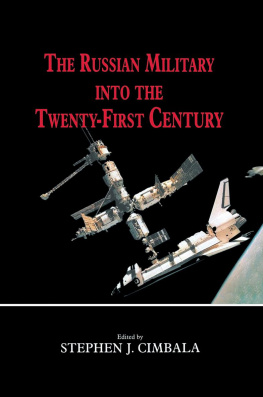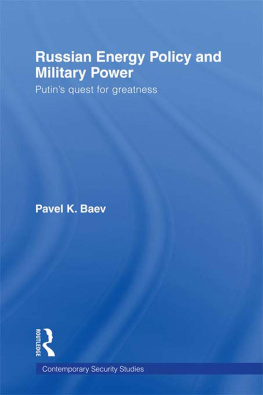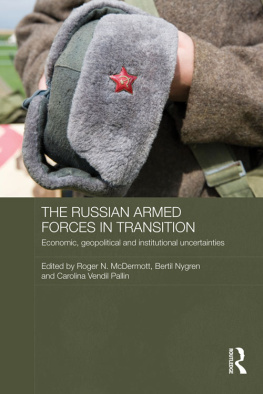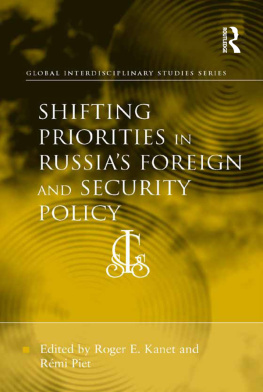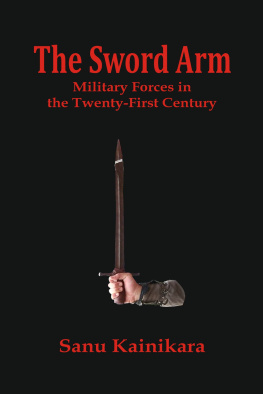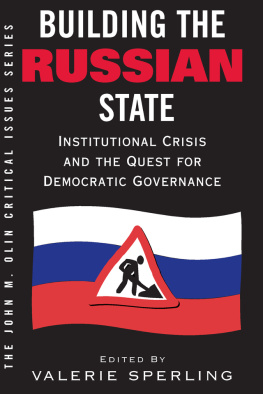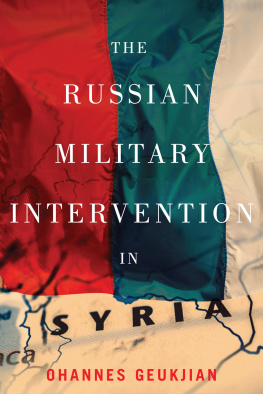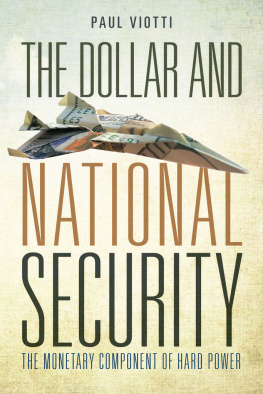SSI Monograph
RUSSIAN MILITARY POLITICS
AND RUSSIAS 2010 DEFENSE DOCTRINE
Stephen J. Blank
Editor
March 2011
The views expressed in this report are those of the authors and do not necessarily reflect the official policy or position of the Department of the Army, the Department of Defense, or the U.S. Government. Authors of Strategic Studies Institute (SSI) publications enjoy full academic freedom, provided they do not disclose classified information, jeopardize operations security, or misrepresent official U.S. policy. Such academic freedom empowers them to offer new and sometimes controversial perspectives in the interest of furthering debate on key issues. This monograph is cleared for public release; distribution is unlimited.
*****
This publication is subject to Title 17, United States Code, Sections 101 and 105. It is in the public domain and may not be copyrighted.
*****
Comments pertaining to this report are invited and should be forwarded to: Director, Strategic Studies Institute, U.S. Army War College, 632 Wright Ave, Carlisle, PA 17013-5046.
*****
All Strategic Studies Institute (SSI) publications may be downloaded free of charge from the SSI website. Hard copies of this report may also be obtained free of charge while supplies last by placing an order on the SSI website. The SSI website address is: www.StrategicStudiesInstitute.army.mil .
*****
The Strategic Studies Institute publishes a monthly e-mail newsletter to update the national security community on the research of our analysts, recent and forthcoming publications, and upcoming conferences sponsored by the Institute. Each newsletter also provides a strategic commentary by one of our research analysts. If you are interested in receiving this newsletter, please subscribe on the SSI website at www.StrategicStudiesInstitute.army.mil / newsletter/.
ISBN 1-58487-482-1
CONTENTS
Foreword ...................................................................v
Introduction ............................................................vii
1. Russias Military Doctrine Development
(2000-10) ............................................................... 1
Marcel de Haas
2. Russian Military Doctrine: Past, Present,
and Future ..........................................................63
Jacob W. Kipp
3. Russian Defense Doctrine .............................. 153
Alexander G. Savelyev
About the Contributors ....................................... 181
FOREWORD
This monograph is the third in the series of monographs stemming from the Strategic Studies Institute-U.S. State Department conference on Russia in January 2010. It is devoted to a consideration of Russias military doctrine. Russia had long before the conference announced the impending release of a new defense or military doctrine, but its release date was always being delayed, signifying a sharp political struggle over its contents. Although the doctrine ultimately was released on February 5, 2010, after the conference, the papers were nonetheless able to some degree to use the new text in their analysis. As a result, these three chapters provide an extremely revealing examination of the struggles over defining the threats facing Russia and the responses that the government should take to meet them. These struggles, as delineated here, provide deep insight into the nature of Russian security and military politics and the evolving views of key military and governmental institutions. No understanding of contemporary Russian defense and overall security policy is truly complete without taking into account the backstage politics described here. Neither is the doctrine entirely comprehensible without the kind of analysis that is offered.
For these reasons we offer this monograph to our readers so that they can benefit from the expert insights of the authors.
DOUGLAS C. LOVELACE, JR.
Director
Strategic Studies Institute
INTRODUCTION
On January 25-26, 2010, the Strategic Studies Institute (SSI) organized a conference entitled, Contemporary Issues in International Security, at the Finnish Embassy in Washington, DC. This was the second in what we hope will be annual conferences bringing together U.S., European, and Russian scholars and experts to discuss such issues in an open forum. The importance of such regular dialogues among experts is well known, and the benefits of these discussions are considerable. Just as we published the papers of the 2008 conference in 2009, (Stephen J. Blank, ed., Prospects for US-Russian Security Cooperation , Carlisle, PA: Strategic Studies Institute, U.S. Army War College, 2009), we are doing so now. However, in this case, we are publishing the papers on a panel by panel basis.
This monograph on Russias defense or military doctrine represents the third of the five monographs that we will be publishing. It consists of three deeply probing essays into the genesis of the doctrine, the political struggle behind it, and the actual content of the doctrine. They reveal a highly politicized minefield of struggle comprising leading actors in the Russian military, government, and security policy circles as a whole. They duly illuminate the ongoing struggles between and among these sets of military and civilian elites and therefore cast a shining light on critical aspects of Russian policy that all too often are left in the darkness.
In this context, it is fair to say that it would be impossible to grasp fully the nature and direction of current Russian security policies without such an examination of the struggle to formulate it and present it to the public. The question of what direction Russian policy is following is of the utmost importance, given Russias importance in world politics and the new Russian policy of the Obama administration. Therefore, the clarification of otherwise murky and obscure trends that are of great significance to the United States will be of great value to our readers and audience.
STEPHEN J. BLANK
Editor
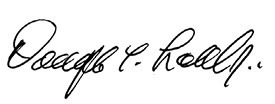
CHAPTER 1
RUSSIAS MILITARY DOCTRINE
DEVELOPMENT
(2000-10)
Marcel de Haas
In assessing Russias security policy, the analysis of military doctrine plays an important role. Military doctrine forms a part of the national security policy and is a reflection of past and possibly future political-military policy. Therefore, to gain a good insight into Russian security policy, a thorough analysis of the development of Russian military doctrine is essential. This chapter concentrates on Russian doctrinal thinking during the presidencies of Vladimir Putin and Dmitry Medvedev since 2000. Furthermore, this doctrinal review is generally limited to elements on external security, with the exception of the use of military force against internal threats, e.g., the conflicts in and around Chechnya. The introduction describes the theoretical setting of military doctrine within Russian security thinking and will also provide a brief overview of doctrinal developments in the 1990s. Next, Putins first and only Military Doctrine of 2000 will be explained. Subsequently, the paper of 2003, which I depict as a defense white paper, was the following major security document on doctrinal thinking. After 2003, no documents related to military doctrine have been released. However, the security elitepoliticians, military, and academicsregularly made statements on doctrinal thinking. As of December 2008, reports on a forthcoming new military doctrinereplacing the one of 2000became stronger, accompanied with excerpts of this upcoming security document. Finally, on February 5, 2010, the new military doctrine was released. This chapter ends with conclusions on Russias doctrinal development since 2000.



